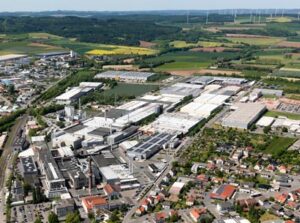Continental’s Korbach tire plant earns ISCC Plus certification
Hanover, Germany – The Continental tire plant in Korbach, Germany, recently became the company’s fourth plant to receive the International Sustainability and Carbon Certification (ISCC) PLUS sustainability certification. This globally recognized standard certifies that Continental meets specific sustainability documentation requirements relating to the use of more sustainable materials. It also confirms the transparent traceability of the raw materials used in the production process. Certification of the raw materials enables Continental to ensure the end-to-end traceability of materials from renewable and recycled sources. For the premium manufacturer, this is a further step on the way to 100 percent sustainable materials in its tire products by 2050 at the latest. In addition to the tire plant in Korbach, the plants in Lousado (Portugal), Hefei (China) and Puchov (Slovakia) are already ISCC PLUS-certified production sites of Continental Tires.
The certification was based on compliance with and documentation of certain processes for the mass balance of raw materials. The mass-balance approach mixes fossil, renewable and recycled raw materials in existing systems and processes. The quantities used are tracked along the entire value chain and can therefore be allocated proportionately at any time. The mass-balance approach enables Continental to gradually increase the proportion of sustainable materials in its products. It ensures that the share of certified sustainable materials can be accurately reported.
“We are consistently increasing the amount of renewable and recycled materials in our tires. Certifications contribute to transparency,” says Jorge Almeida, Head of Sustainability at Continental Tires. He adds: “Our ambition is to roll out the mass-balance approach to all of our tire plants worldwide.”
“At Continental, we are working worldwide to make the future of mobility more environmentally friendly. Our ISCC PLUS certification as well as our latest step, the use of recycled PET bottles in series production, are proof of our consistent implementation here in Korbach,” says Klaus Ohlwein, Head of the Continental tire plant in Korbach. “We offer our customers high-performance tires that not only deliver outstanding performance but also increasingly support the bio-based and circular economy,” Ohlwein continues.
International Sustainability and Carbon Certification (ISCC) was established in 2010 as part of a multi-stakeholder initiative and is a globally applicable and leading certification system aimed at promoting a traceable, sustainable, deforestation-free and climate-friendly supply chain. ISCC certifications are widely recognized and encompass sustainable agricultural biomass, biogenic waste and residues, non-biological renewable materials, and recycled carbon-based materials. The development and implementation of various certification standards is ISCC’s tool for furthering its mission to mitigate climate change and bring greater traceability to global markets and supply chains.
The UltraContact NXT is the first production tire for which Continental uses mass-balance-certified materials. Examples include synthetic rubber made from bio-based and bio-circular raw materials or carbon black, which is produced in part using oil from circular processes. It is manufactured at the Continental tire plant in Lousado, Portugal, since 2023.
Continental is working hard to replace as many raw materials as possible in production with sustainable alternatives. Raw materials that will be used in tire production in the future include, for example, agricultural waste such as the ash from rice husks, sustainable carbon black or recycled steel.
The certification of the Continental plants is an important milestone in Continental’s efforts to use more than 40 percent renewable and recycled materials in its tires by 2030 and to become completely climate-neutral by 2050. By 2050 at the latest, all new tires from Continental are to be made entirely from sustainable materials.
In addition to car tires, including high-performance (UUHP) tires for technologically advanced vehicles, the Continental tire plant in Korbach also produces bicycle tires. These are specifically designed for professionals such as riders taking part in the Tour de France. Other highlights from Korbach include the High Performance Technology Center (HPTC) and the “Urban Taraxagum” bicycle tire, which is the only production tire containing natural rubber from dandelions. Motorcycle tires like the “ContiRoadAttack 4” and industrial tires for forklift trucks round out the product portfolio. Furthermore, the plant produces hoses for the ContiTech group sector. The Korbach site has more than 3,600 employees.

